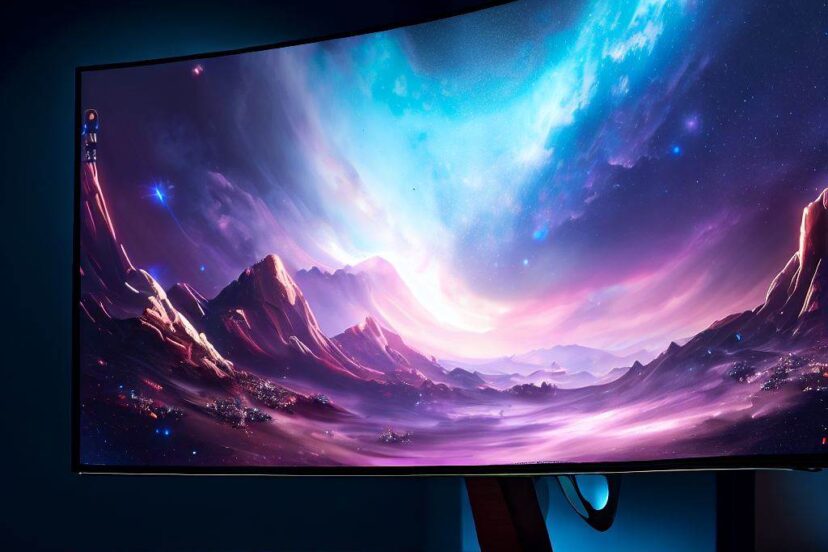4K Gaming Monitor: Crisp and Clear
*We may earn a commission for purchases made using our links. Please see our disclosure to learn more.
4K Gaming Monitor: Top Picks for Ultimate Resolution
Gaming has evolved significantly, and visuals play a big part in the experience. A 4K gaming monitor can take your gaming to the next level with its incredible resolution and sharpness. Gamers get to enjoy the finer details in their favorite games, making everything look more vibrant and lifelike.
When shopping for a 4K gaming monitor, several factors are important. Refresh rate, response time, and panel type are key. Higher refresh rates (120Hz or above) make for smoother gameplay, especially in fast-paced titles. Low response times reduce ghosting and blurring. Also, the type of panel (IPS, TN, or VA) impacts color accuracy and viewing angles.
We tested several 4K gaming monitors to find the ones that deliver the best gaming experience.
Best 4K Gaming Monitors
I’ve put together a list of the top 4K gaming monitors you can buy. These choices offer great performance for all your gaming needs.
ASUS TUF Gaming VG289Q1A 28” 4K Gaming Monitor
This ASUS TUF Gaming monitor is a great buy for anyone seeking stunning visuals and smooth performance.
Pros
- Stunning 4K visuals
- Enhanced color accuracy with HDR10
- FreeSync technology prevents screen tearing
Cons
- HDR can sometimes appear too dark
- Slightly heavier than other monitors
- Requires fine-tuning for optimal color balance
The first time I played games on the ASUS TUF Gaming VG289Q1A, I was blown away by the 4K visuals. Colors popped with exceptional clarity, making my gaming experience much more immersive.
One thing I love about this monitor is the FreeSync technology, which effectively stops screen tearing and gives me smooth gameplay. Additionally, the HDR10 support means that colors and brightness are much more realistic.
On the downside, I noticed that HDR sometimes makes darker scenes too dim, which can be a bit annoying during gameplay. The monitor is a bit heavier compared to others I’ve used, which made installation tricky. Lastly, I had to spend some time adjusting the color settings to get it just right for my taste.
Overall, it’s a solid choice for gamers wanting crisp and detailed visuals.
MSI MAG274UPF 4K Gaming Monitor
This MSI monitor is a must-have for any serious gamer looking for top-tier performance and visuals.
Pros
- Stunning 4K resolution with vibrant colors
- Fast 144Hz refresh rate for smooth gaming
- Swift 1ms response time
Cons
- Noticeable matte coating on light backgrounds
- Limited analog connectivity options
- Heavier than some other monitors
The MSI MAG274UPF 27” 4K Gaming Monitor has been a game-changer in my setup. Its 4K resolution delivers jaw-dropping visuals that enhance every detail in my games. The colors are vivid, making the gaming experience more immersive.
I was particularly impressed with the 144Hz refresh rate. This monitor provides smooth gameplay without any annoying stutters. Additionally, the 1ms response time ensures there’s no lag or screen tearing, which is crucial when I’m in intense gaming sessions.
Despite its many strengths, I did notice the matte coating can be quite visible on white backgrounds, which is a bit distracting. Also, the lack of analog ports might be inconvenient for users with older setups. Finally, the monitor is a bit on the heavier side, making it a little challenging to move around.
For more details, you can check out the MSI MAG274UPF 4K Gaming Monitor. This monitor blends stellar performance with impressive visuals, making it a valuable addition to any gaming rig.
Samsung Odyssey G55A
If you’re looking for a gaming monitor that enhances your performance with stunning visuals, this is a great choice.
Pros
- Incredible WQHD clarity
- High 165Hz refresh rate
- Fast 1ms response time
Cons
- Occasional HDR issues
- Limited HDMI ports
- No built-in speakers
The Samsung Odyssey G55A truly stands out with its WQHD resolution. The images are incredibly clear and detailed, bringing the gaming environment to life. I personally found the colors vibrant and the contrast sharp, making each game session visually impressive.
With a 165Hz refresh rate, gameplay feels silky smooth. I didn’t notice any lag or blur, even during fast action scenes. This is a big plus for competitive gaming where every millisecond counts.
The 1ms response time ensures quick reactions. I felt like I was always a step ahead of my opponents. However, I did experience some issues with HDR switching on and off at times which was a bit distracting.
One downside is the limited number of HDMI ports. If you have multiple devices, this could be a hassle. Another minor gripe is the lack of built-in speakers, but quality external ones can easily solve this. Overall, this monitor offers an exceptional gaming experience.
Sceptre 27-inch 100Hz Gaming Monitor
This monitor is a great option if you want smooth gaming and solid features at an affordable price.
Pros
- High refresh rate
- Good color reproduction
- Multiple connectivity options
Cons
- Built-in speakers are not very powerful
- Lower resolution compared to 4K monitors
- Occasional issues with auto shut-down
I recently got to use the Sceptre 27-inch 100Hz Gaming Monitor and was impressed by the overall experience. The monitor’s 100Hz refresh rate made games feel fluid and responsive, which is essential for competitive gaming.
The color accuracy is quite good thanks to the 100% sRGB color gamut. It brings out vibrant colors, making games and media content look more alive. Having various connectivity options, including two HDMI ports and a DisplayPort, was really convenient for switching between my PC and gaming console.
There are some downsides, though. The built-in speakers are not as strong as I had hoped. They will suffice in a quiet room, but you might want to pair this monitor with some external speakers for better sound quality.
Additionally, the resolution of 1920 x 1080 pixels isn’t as sharp as what you’d get from a 4K monitor. Still, it’s clear enough for most uses and helps keep the cost down. Lastly, I did experience the monitor randomly shutting down a few times, which might be an annoyance during long gaming sessions.
Despite these minor issues, the Sceptre 27-inch 100Hz Gaming Monitor offers great value and performance for its price range.
Dell S3221QS 32 Inch Curved 4K UHD Monitor
The Dell S3221QS stands out with its stunning 4K resolution and immersive curved display, making it a top choice for any gaming setup.
Pros
- Amazing 4K clarity and fine detail
- Immersive curved screen
- Adjustable stand for comfort
Cons
- Curved screen may not be for everyone
- Only 60Hz refresh rate
- Built-in speakers are just average
I was immediately impressed by the Dell S3221QS’s 31.5-inch 4K display. The picture quality is crystal clear, with lifelike colors that make games and movies pop. The three-sided ultrathin bezel design adds to the immersive experience, drawing you straight into the action.
The curved 1800R screen is a game changer. It expands the field of vision, providing a wrap-around view that makes everything feel more engaging. This feature is particularly great for gaming and watching movies.
The TÜV-certified flicker-free screen with ComfortView reduces eye strain, making it comfortable to use for extended periods. Plus, the stand is fully adjustable, allowing you to pivot, tilt, and swivel the monitor for the perfect setup.
If you’re looking for an exceptional 4K gaming monitor that blends performance and comfort, I think the Dell S3221QS is worth considering.
Buying Guide
When choosing a 4K gaming monitor, there are a few things to keep in mind.
Resolution and Refresh Rate
Resolution: A 4K monitor has a resolution of 3840 x 2160 pixels. This offers sharp and clear images.
Refresh Rate: Look for a refresh rate of at least 60Hz for smoother gameplay. Higher refresh rates like 120Hz or 144Hz are even better.
Response Time
Response time is how quickly a pixel can change colors. Lower response times like 1ms or 5ms are best for fast-paced games. This helps to reduce ghosting and blur.
Panel Type
IPS: Provides better color accuracy and wider viewing angles.
TN: Usually has faster response times but poorer color and angles.
VA: Offers good balance between color and speed.
Connectivity Options
Make sure the monitor has ports like HDMI 2.0, DisplayPort 1.4, or USB-C for easy connection with your gaming rig.
Adaptive Sync Technology
Look for G-Sync or FreeSync. These technologies reduce screen tearing and provide smoother gameplay.
Other Features
HDR: High Dynamic Range can improve picture quality with better contrast and brightness.
Ergonomics: Check if the monitor stand is adjustable for better viewing comfort.
Built-in Speakers: Handy if you don’t have external speakers.
Consider these features to find the best match for your gaming needs.
Frequently Asked Questions
I’ve gathered some common questions about 4K gaming monitors to help you make informed decisions. Whether you’re interested in the refresh rate, screen size, or specific gaming consoles, you’ll find valuable information here.
1. What are the benefits of a 4K gaming monitor over a standard 1080p display?
A 4K gaming monitor offers four times the resolution of a standard 1080p display. This means sharper and more detailed visuals. It enhances the overall gaming experience with crisper textures and more vivid colors.
2. Are there any 4K gaming monitors with a 240Hz refresh rate available on the market?
Yes, there are 4K gaming monitors with a 240Hz refresh rate available. These monitors are relatively new but offer smooth gameplay with reduced motion blur. They are ideal for competitive gaming.
3. How do I choose the best 4K gaming monitor for fast-paced games?
Look for a monitor with a high refresh rate (at least 120Hz) and low response time (1ms). These features ensure smooth and responsive gameplay. Additionally, consider G-Sync or FreeSync support to avoid screen tearing.
4. Can a 32-inch 4K gaming monitor provide a more immersive gaming experience?
Yes, a 32-inch 4K gaming monitor can provide a more immersive experience. The larger screen size offers more space for game details. It can make gameplay feel more engaging and lifelike, especially when playing open-world games.
5. What features should I look for in a 4K gaming monitor compatible with Xbox Series X?
Ensure the monitor supports HDMI 2.1 for optimal performance with the Xbox Series X. Look for features like 120Hz refresh rate, HDR support, and low input lag. These will help you get the best out of your gaming console.









